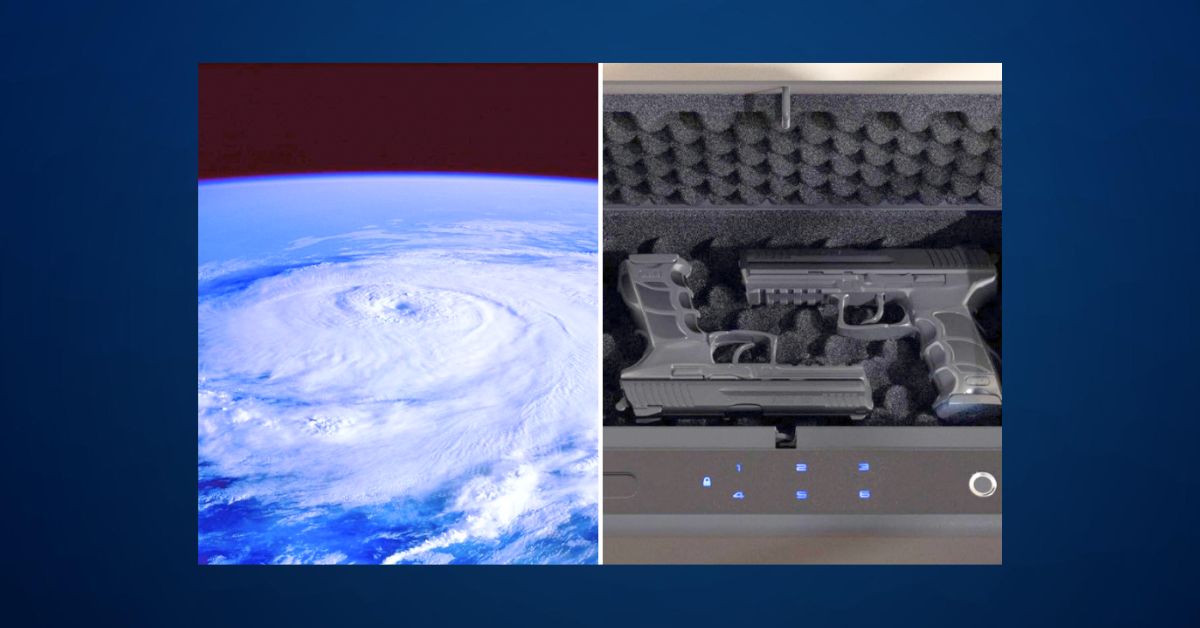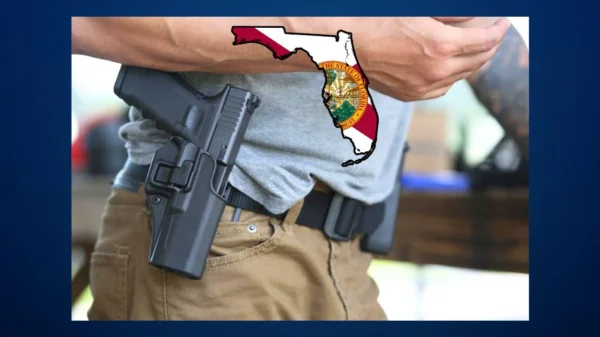By Sam Jacobs, writer, and chief historian, at Ammo
As Florida braces for yet another hurricane, residents are taking vital steps to protect their homes and families. While storm shutters are being fastened, patio furniture is being brought inside, and valuables are being moved to higher ground, firearm owners face additional challenges. Ensuring that firearms are secured before evacuating is crucial for both safety and compliance with legal requirements.
Transporting Firearms During Evacuation
When preparing to evacuate, experts, including the National Rifle Association (NRA), advise bringing firearms with you. Disassembling rifles can make them more manageable and easier to pack. Firearms that do not need to be immediately accessible should be packed beneath other items to ensure safety.
Florida emergency law permits adults to transport concealed firearms in vehicles without a permit during evacuations. However, firearms must be securely encased or not readily accessible. This can be easily accomplished using a glove compartment, a gun case, a snapped holster, or a closed container.
Know the Laws of Your Destination
If you plan to evacuate outside Florida, familiarize yourself with both the firearm transportation and storage laws of your destination state. Regulations vary widely, and compliance with local laws is essential to avoid legal complications. If staying with friends or family members who have children, state laws may require you to have secure storage for your firearms. Even if the law does not require this, it is still common courtesy to inform anyone you will be staying with of your intention to bring firearms to their home and discuss how you plan to store them.
In some situations, evacuating all of your firearms may be impractical. This is particularly true if you have a large collection that cannot be packed quickly or if you face space constraints in your vehicle. Additionally, many public hurricane shelters in Florida have strict policies prohibiting firearms. These policies are designed to ensure the safety and comfort of all evacuees, especially in high-stress environments. If you plan to use a public shelter, you will need to leave your firearms secured at home.
Even when it is possible to bring firearms with you, hurricane evacuations can be unpredictable. Road closures, traffic jams, or other unforeseen obstacles might force you to abandon your vehicle—and its contents—behind. As a result, many individuals choose to leave their firearms at home when evacuating.
For firearms that must be left behind, proper storage is crucial. Use a high-quality, secure gun safe to protect against theft, particularly from potential looting that may follow a hurricane. A well-made safe will also shield your firearms from physical damage caused by structural collapses due to hurricane winds. To further enhance security, remove bolts or firing mechanisms before storing firearms. This precaution can help prevent unauthorized use if the safe is breached.
If a gun safe is not accessible, consider alternative storage solutions. A locked metal storage cabinet or a locked chest freezer can offer a measure of protection, although these options are less secure than a dedicated gun safe. While not ideal, these methods can still help safeguard your firearms during the storm.
Protecting Firearms from Moisture
While many gun safes are water-resistant, they are rarely completely waterproof. Therefore, it is crucial to place the safe above potential flood levels to prevent water damage. Hurricanes bring high humidity and moisture, which can corrode firearms. To combat this, consider placing dehumidifiers such as silica gel packets inside the safe. In a pinch, a bowl of rice can help control moisture. Additionally, keeping firearms clean and well-lubricated with high-quality oil can go a long way in preventing rust and other forms of moisture damage.
Regardless of whether you are taking your firearms with you during evacuation or not, you should make sure your insurance coverage is up to date. Make sure you document all firearms, including the serial number, model, and condition, and take photos for insurance.
If the worst happens and your firearms are damaged or stolen, promptly file a claim with your insurance company. Provide them with the documentation and photographs you have prepared. Additionally, contact local law enforcement to report any theft or damage. This will help in the recovery process and ensure that your firearms are not used unlawfully.

















